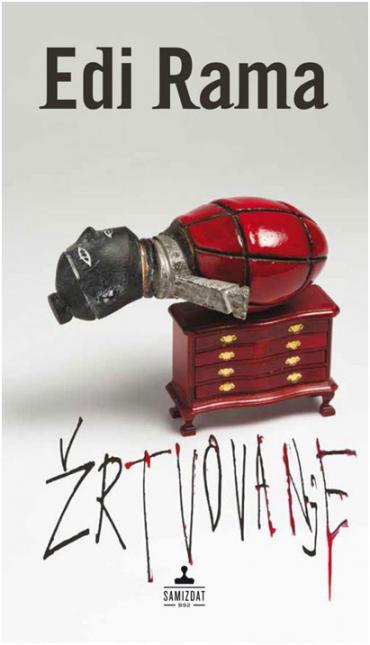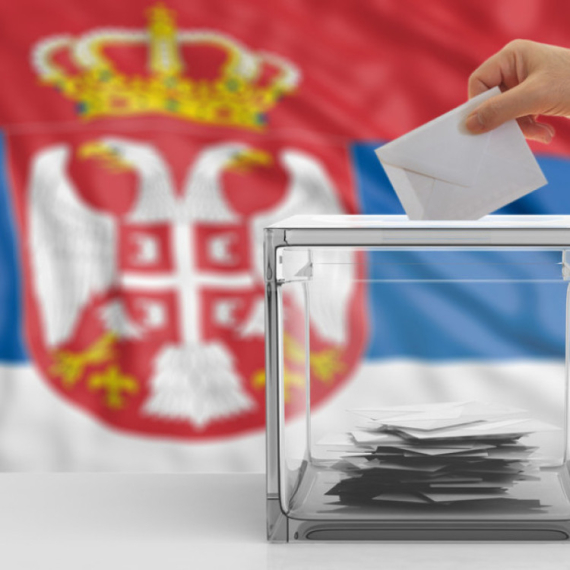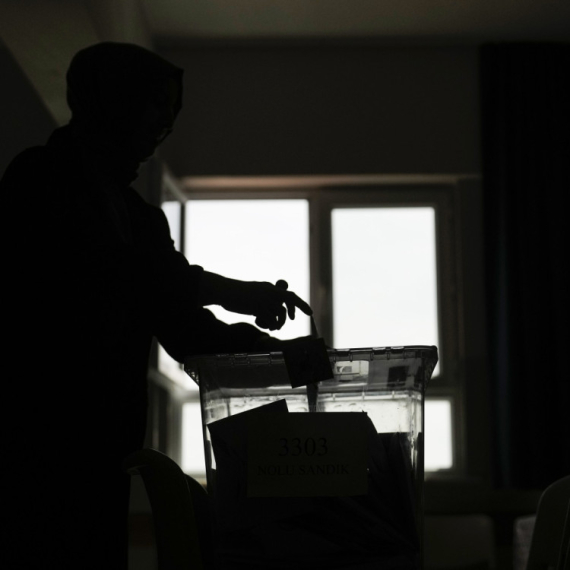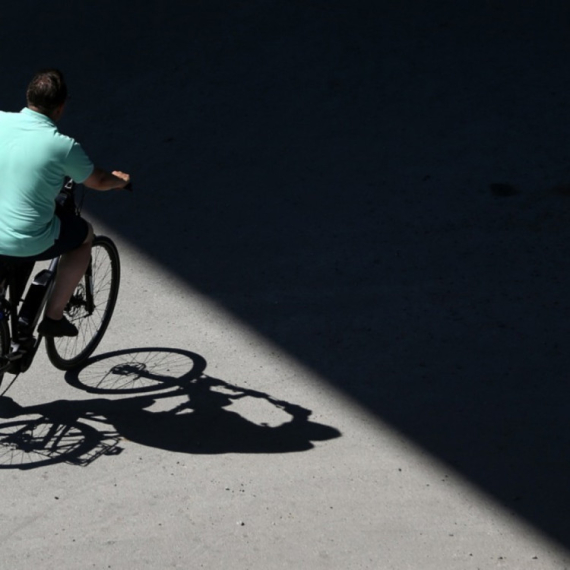Edi Rama – An idealist
"Rama wants – why wouldn’t we believe him – another and different Albania, surely better than the one that he evokes with huge pride and pain."
Saturday, 15.10.2016.
08:15

Edi Rama – An idealist
Inviolable for more than a decade, praised and hoisted, referred to as genius of international class, he ended up brutally defeated. As he himself depicts excellently, when he stepped out of the city office, the winners had slaughtered a lamb as a sacrifice for victory. Blood traces were still fresh when he wrote those lines, and it gave him shivers – this is tangible in the book itself – when he mentioned this scene. There is no trueborn theorist of literature that wouldn’t say that there was no better moment for him to sit down to write – if he wanted to – than at this point of time. All this given that: on the bottom of every defeat, there lies the straightforwardness as the only salvation, and then the defeat starts working against itself. Political and human crisis he faced with that summer had become sudden but excellent allies. Once when he spoke out the way he did out of defeat and as a result of crisis in this book, with an enormous amount of frankness, he had a chance to win it, both in the same time.In reality of Albania, this will happen only two years afterwards, when Rama won the elections, becoming Albania’s Prime Minister. He does not write about this in the book “Sacrifice”, he deals with the fall from power in the capital of Albania, but right in this book, he made preparations for his comeback. This is something fascinating in its appearance, and in his intention to play with it as a trump card. We all know that Rama is a painter. (That this fact had inspired him to paint city facades in the bright Mediterranean colors, transforming Tirana from a grey, guttered and dirty settlement, the damp city, to a world miracle.) But as a painter, or broadly speaking, as an artist that entered politics, he was incomparable as he stayed devoted to artistic instruments, still assured that he could use them well in fulfilling even political goals. Do not be afraid that we are talking about manipulation that brings art into a position to become the servant of the politics. It is not this at all. To the contrary: its autonomy is not touched, but it works in paradoxical ways in synergy with this discipline which is its eternal, mortal enemy. Rama managed to unit them from time to time or temporarily, thus becoming triumphant. Our Bogdan Bogdanovic, also an artist, and also at some point Belgrade mayor, hasn’t been so successful. The colors on Tirana’s facades prove Rama’s success. And this book that I write about also proves his success.
Magnificent, invincible art! Still, Rama loved politics even as a student of Academy. (He is inspired by eroticism of both professions). He asked from politics – as he at least testifies – always the same that he asked from the art that he was devoted to at first: freedom and truth. It sounds pathetic, but it exactly comes to this, when all is summed up. Of course, we are not young enough not to be aware of the fact that political scoundrels speak the same about those issues. But what makes Rama one of those to who we should pay attention is not the fact that he made ideals out of the principles of freedom and truth, but he made a practice out of ideals. He paid sometimes a very high price for this. Once, his father and brother had found him one night in some ditch near the building where they used to live, all covered in blood and bruises, beaten up by some politically instructed adversary gang. That is how it was when he entered into politics (when, as he claims, he changed suits, and purple socks replaced with grey ones). And at the point when he was already heading Socialist Party, he went on protest against Berisha’s government, exactly in that critical 2011 when he wrote the book, he was informed by a foreign embassy that his assassination has been planned. If you thought for a second, please forget it: he is the man who does not strike you as paranoid. He describes this issue in the book more with regret then with fear.
I haven’t forgotten freedom and truth: Rama writes about it in a very specific way. He never perceives it as stillness and dogma, but always regards it as moving, and transforming. “This world is really wonderful”, he says at some point in the book, “exactly as it is not given once and for all, so our histories in this heavy darkness in which we cannot find peace, are still open, as well as endlessly different". He will implement this formula that you’ll easily find with French existentialists from whom he obviously learned a lot while he was studying in Paris, upon perceiving life as such, as well as “restricted air” of political life, including his former political friends, and afterwards adversaries. Namely, he laments over Ilir Meta and Fatos Nano, or he does not. What he knows without any doubt is that we have to go on. Alongside, I think that the source of his moral imperatives in Albanian tradition is very important: when he had taken over the mayor’s position, he went to his father’s grave, to swear that he will remain honorable, right there, all alone and in silence. (He assures us that two turtles – he got as a gift to heal his asthma – present the highest bribe that he ever accepted). He will always prefer to quote his grandmother than Webber. He perceives his family as a pillar of life. It is not surprising then to be confronted with the powerfulness that gushes out from the pages in the book when he describes the cancer treatment of his eleven year old son Greg. Somewhere else, this will end up in a melodrama, and here, it remains drama alone.
“Sacrifice" is a book on Albanian internal issues. He mentions others rarely, the Serbs exactly three times, and only through those three words: Zemun clan members, Arkan, and, Milosevic’s style. And he did it all three times without any malicious considerations. He mentioned Milosevic alongside the man who is personae dramatis of his book: this is Sali Berisha. Berisha once thought of organizing counter rally and that is the point when Rama recalls our man. When you read his book, it is hard to perceive Berisha as anything else than an utter bustard. He embodies Enverism that entered new epoch, a kind of amorality, that betrays everything for levers of power. Rama’s mother is a physician, and Berisha is also physician, and this politician that ruled the state at a time, called upon his mother from parliamentary speaker to admit (“she and I are aware of this, as colleagues”) that her son is abuser at home, on the street, that she used to treat him from schizophrenia, and in the end, that he is – what else could he be – a man with homosexual preferences. Rama lives in this melting pot. He describes it swiftly, without hesitation or looking back, without allowing anyone to wonder over something, afraid that he will not have time to tell us all, he writes breathlessly, as a man chasing the runaway tram. Where the confession stops, his memoirs begin, where they stop, the pamphlet begins. Rama follows Zola’s and Krleza’s path, he accuses and confronts them in the same time. The pages where he speaks about the state of Albanian cities and settlements are impressive. This is not only the description of general disaster and misery, it is something more than that: the description of transitional cataclysm, that hadn’t sailed past the wonderful coast of the Ionian Sea. Rama wants - why wouldn’t we believe him – another, different Albania, surely better than the one that he evokes with huge pride and pain."
A friend
Mrdjan Bajic
I’ve met Edi Rama, the then colleague artist, in the nineties in Paris, at times when we both had artistic and political reasons to stay away from the regimes that used to lead our countries back then.
From the multiethnic tolerant Parisian perspective, socializing of an Albanian and a Serb hadn’t caused any consternation at all, as it is still being encouraged here, as I can see.
Back then, Edi Rama was a correct and intelligent man, who spoke English and French perfectly, and he was full of surprising stories on Kadare, Enver Hoxha, bunkers, Tirana and all other visions shared by people that spent their childhood deeply or lightly immersed into the countries behind the iron curtain.
The legends had been spread for years about his activism, which unlike others that show their standpoints only in white gallery rooms, he implemented as a mayor of Tirana, the city that he managed to clear from illegal constructions, and in which microstructures he managed to infiltrate artistic actions. This is in a way the main topic of the book “Sacrifice".
After a very long time, I had seen him, briefly and sincerely, on the occasion of his first official visit to Belgrade in the position of Prime Minister. But I believe that there is detailed local report about this encounter :)
I had also heard his lecture on the need of understanding and the necessity of exchange and establishing normal neighborhood communication, which starting points I completely share. That is why, on Veran Matic’s proposal, I had designed quickly and swiftly the jacket for the book
“Sacrifice", which was rather easy: given that Edi preferred it to be some of my old art works from the series “Daddu's gift" that he remembered and which he described in his text “Arms of my Serbian friend" that was published in the nineties in the popular Albanian newspapers, and that caused him, as he told me, lots of troubles and questionings.
I look forward to his coming again for a visit, and I hope that his visits would lose in their aspect of regional drama and gain more relaxing character of mutual national maturity and neighborhood normality as a precondition for tolerance and to the mutual benefit.


























































Komentari 2
Pogledaj komentare